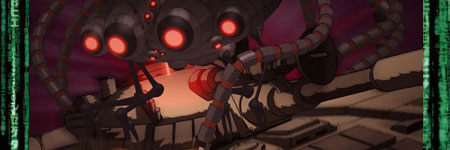|
|

Animatrix Index & Auctions >>
Michael Arias Interview |
DVD Review
A TALK WITH MICHAEL ARIAS - 05/28/03
What is behind The Animatrix? You get an opportunity to possibly find out. To begin, I invite along my pal, writer Ben Coleman, so he and I can talk with The Animatrix segment producer, Michael Arias.

World Famous Comics: Thanks for making time for us, Michael. As we understand it, this is your first time working as a producer. However, you are not a stranger to the process of filmmaking. You were a motion control cameraperson on THE ABYSS and a software developer on PRINCESS MONONOKE and PRINCE OF EGYPT. What sort of past experience did you bring to THE ANIMATRIX?
 Michael Arias: Kind of a jack of all trades I hate to say. I used to do a great deal of visual effects work - actually I first met John Gaeta, MATRIX's VFX supervisor, when we were both working on the BACK TO THE FUTURE attraction for Universal Studios. I started using computer graphics when I first moved to Japan, 11 or 12 years ago, and since then I've worked as both animator and software developer - when I began CG you had to know a bit of both to get anything done. But I think what I brought to ANIMATRIX, more than any kind of technical knowledge, was a knowledge of both animation and effects filmmaking cultures in each country. Beyond speaking both Japanese and English fluently, I also am able to relate to both the big-budget effects film mentality of the Wachowskis and their crew, and also to the independent low-budget animation culture of the studios I work with here in Tokyo.
Michael Arias: Kind of a jack of all trades I hate to say. I used to do a great deal of visual effects work - actually I first met John Gaeta, MATRIX's VFX supervisor, when we were both working on the BACK TO THE FUTURE attraction for Universal Studios. I started using computer graphics when I first moved to Japan, 11 or 12 years ago, and since then I've worked as both animator and software developer - when I began CG you had to know a bit of both to get anything done. But I think what I brought to ANIMATRIX, more than any kind of technical knowledge, was a knowledge of both animation and effects filmmaking cultures in each country. Beyond speaking both Japanese and English fluently, I also am able to relate to both the big-budget effects film mentality of the Wachowskis and their crew, and also to the independent low-budget animation culture of the studios I work with here in Tokyo.
WFC: As a computer animation software guy, THE ANIMATRIX must have been really exciting for you to work on. Tell us about it.
MA: Exciting, yes, but quite honestly I am much more impressed by clever filmmaking than I am by technology. I started doing special effects and later CG because I love movies, not because I love special effects or CG or technology itself. Working with all of the directors on this project, and also with the Wachowskis themselves was the real thrill.
WFC: There was such a diverse range of styles and creative minds that contributed to THE ANIMATRIX. Even with all these cooks in the kitchen, it looks like you did a great job wrangling everyone and it's a fantastic final product. Was it a challenge to try and make all of that work together?
MA: Thanks - coordinating the whole thing was an enormous challenge. I don't have much experience as a producer but I had great partners - Joel Silver and his team of course, as well as Hiroaki Takeuchi, Eiko Tanaka, and the other production staff at the studios.
WFC: What are some of your own creative influences, who do you look up to and how did they inspire your work on THE ANIMATRIX?
MA: I watch tons of movies, read tons of books, comics, listen to music all the time, and look at a great deal of art. But my role on this show was not a particularly creative one, so I don't feel quite right answering this question. Perhaps when I get the chance to direct...
WFC: You got it. After you direct your first piece, we'll hopefully get a chance to ask you this question again. Since you mentioned comics as an influence and we're, as if you couldn't tell, huge comic book fans, can you recommend for us some comics or graphic novels?
MA: Anything by Taiyou Matsumoto, Kent Williams, or Dave McKean.
WFC: The very first ANIMATRIX short is very literal and straight forward while the last one is abstract and philosophical. Was the order in which any or all the shorts appear on the DVD deliberate?

MA: Unfortunately, when we began we gave each episode a number - more or less the order in which they were executed - and these numbers were adopted as the order on the DVD. By the time I got wind of it there was no room to make changes. Andy and Larry also had their own agenda for sequencing, which may not have been reflected in the ultimate ordering.
WFC: Which short was your favorite to actually work on and why?
MA: I won't say which was my favorite, and to be honest it's difficult to pick a favorite - I do love them all. But I did have a great deal of fun working on THE SECOND RENAISSANCE. Lots of CG (I modelled the sentinels and wrote a great deal of software for RENAISSANCE).

WFC: When looking at the finished shorts, which is your favorite to watch and why?
MA: I think KID'S STORY is probably my favorite looking episode. Hard to explain but because its entirely a 2D - traditional show - it's really magical for me to watch. Shinji Hashimoto did an incredible job animating this one.

WFC: You seem very comfortable working around and in some cases directly with the Japanese teams and creators. Can you tell us about this?
MA: There's nothing more exciting to me than working with amazing artists on fantastic material. The animation community here in Japan is a fairly small and close-knit group comprised of really brilliant artists working not for the money or fame, but because they have heart.
WFC: In THE ANIMATRIX DVD's commentary, there are several places where there are comparisions with the American perceptions and views of animation with how the Japanese view it. To us, it seems the Japanese generally have a more enlightened view of animation. While many American's see animated features as something for kids, the Japanese see it as both a serious art form and mature filmmaking. They also consider the creators as artists. Was THE ANIMATRIX made in part to help open American minds? To show them animation as a more serious form of art capable of mature storytelling?
MA: It's true the Japanese have a more mature animation culture - more than any place in the world perhaps, though France and some other European nations also make incredible and quite unique animation. And I certainly hoped that ANIMATRIX might help us change that. On the other hand, I am also skeptical that a collection like this, or a film like SPIRITED AWAY for that matter, has the potential to really turn the tide in the US. It will take several interesting films, backed by patrons with serious marketing and distribution machines in the US (as Warners has) to bring about a change like this. And it will also take a concentrated effort by the Japanese animation industry and artists to make films that will appeal to Americans - there are definitely some cultural differences here that can't be ignored and that will need the proper translation or interpretation to be accessible to both cultures. We spent a great deal of time with the Wachowskis and Japanese directors just making sure that everyone's intentions and reasoning was conveyed to the others properly.
WFC: In Japan, you'll find that comic books (or Manga as they call it), Anime and live-action films have more sophisticated relationships than in the US. Many of their properties are found both on screen and in comics format, usually in print, but sometimes also published on the Web. It is not at all surprising for a property to be found as comics, animated features and live-action films. While different mediums, they all still contribute to the same continuity, creating a very rich and well developed universe. Do you think this is something the Wachowski brothers are trying for? THE ANIMATRIX seems like it would could be part of such a plan.
MA: Yes, I do think that's the case. The Wachowskis have a background in comics themselves, you know, and I think this kind of approach comes naturally to them. In comics it is common practice to have a character - Batman for example - interpreted by various artists.
WFC: Do you believe expanding properties into other mediums more often would be good for the American entertainment industry? One would think that creating an expanded universe would help establish a property more, define the universe better, and create a bigger sandbox for others to be invited to play in. At the very least, couldn't it could generate more work for people? Gotta pay the bills, right?
MA: I suppose it might be a good thing, though there's no shortage of jobs in the film industry - at least the American film industry. I hope it isn't obligatory though. I don't know how people would feel about having to play the ABOUT SCHMIDT video game, or read the THE HOURS comic book. The BOOGIE NIGHTS game would no doubt be a hit though.
WFC: [* laughs *] A BOOGIE NIGHTS video game is actually a pretty scary idea, or genius, depending on how you look at it.
We have to wrap things up now, but we have one more question for you... The Matrix has such a board range of fans. Some of them love the visual style. Others the action. While some love the philosophical underpinnings. It is both eye candy with the cool fashion and special effects and cerebral with the Wachowski brothers taking elements of literature, philosophy, religion and mythology. It resonates differently with each fan. How does it resonate with you? What do you find appealing about the Matrix?
MA: I typically don't like big Hollywood action and effects movies, but THE MATRIX really spoke to me because it seemed so smart, a really subversive social commentary of sorts, a wolf in sheep's clothing really. The Matrix power plant and the simulation driving it can be seen as a metaphor for our own lives and the rules, governments, and authorities which determine so much of what we do and experience. That's my interpretation anyways. And I think a movie which tries to move audiences - big audiences - to question authority in any way at all a good thing. When I saw THE MATRIX I felt that the Wachowskis, though they're certainly rich and famous now, must share a certain garage/punk/do-it-yourself sensibility with me. I've now spent a great deal of time with them and know this to have been the case.
WFC: Having a chance to talk to someone who really understands the craft and cleverness involved in a medium where technology is often the star was a real pleasure for us. It's not obvious to everyone that the creativity of the artist and not the processing power of the computer or the size of your budget that will ultimately tilt the scales and have the final say in the quality, the amount of heart and how compelling a final piece ends up becoming. We're certain that the Wachowski brothers and the other writers and directors really appreciated working with you on THE ANIMATRIX as much as we appreciated having you here. Thanks again for your time with us, it was great having you!
MA: Thanks to you for listening!
Discuss Behind the Animatrix in World Famous Comics' General Forum or with your favorite comic book creator at the World Famous Comics Community.
Get yourself a copy today! The Animatrix is available on VHS and DVD!
Animatrix Index & Auctions >>
Michael Arias Interview |
DVD Review
|
|
|